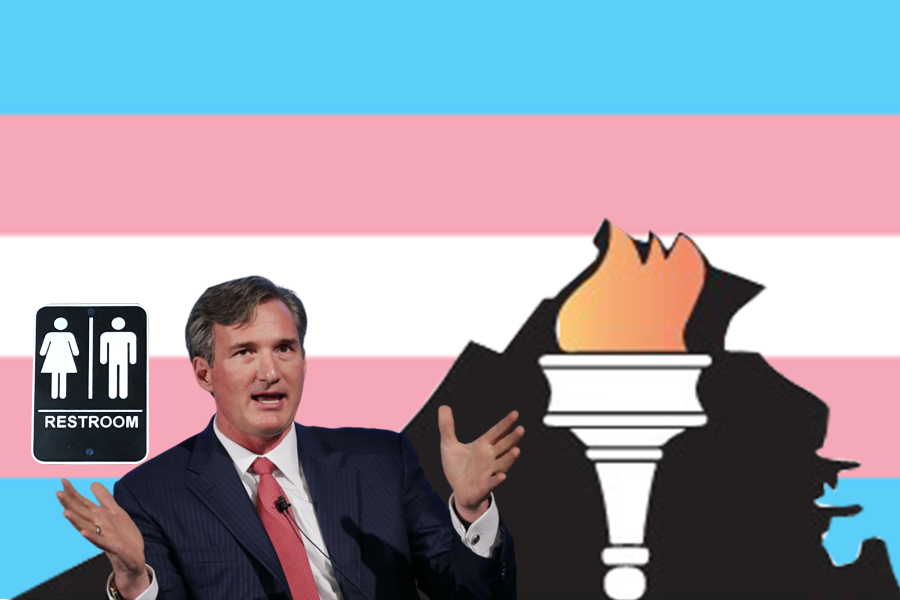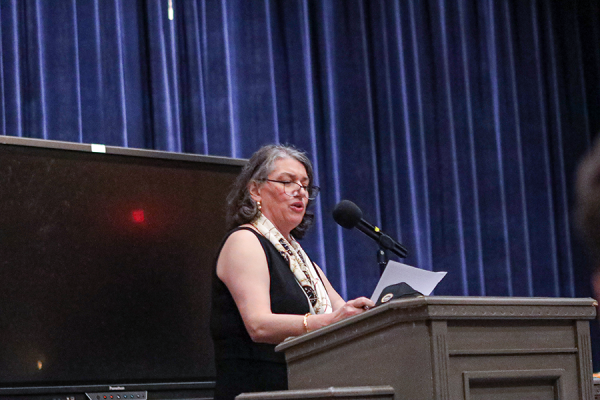Youngkin Proposes New Policy for Transgender Students
Credit: Gray Tracey
Youngkin’s policies roll back previous protections for trans students in Virginia’s schools.
November 12, 2022
Virginia Governor Glenn Youngkin has proposed a new set of policies on how Virginia’s public schools should treat transgender and nonbinary students, one that differs significantly from the previous model policies laid out in 2021. The administration’s stated purpose is to preserve students’ dignity while also supporting the rights of parents to be involved in their children’s education. However, they face strong opposition from students, teachers, and activists, who are concerned about the potential danger they pose to trans students.
The new guidelines mostly boil down to a few key requirements. Some of these regulate student identification. The first is that school staff must refer to students using either their given birth name or a nickname commonly associated with it and gendered pronouns matching the student’s biological sex. To change the name or pronouns the school addresses them by, a student would need written permission from a parent.
Another proposed regulation concerns gender-separated facilities like bathrooms or locker rooms. Under the proposed policies, students who use gendered facilities would be required to use the facility that matches their biological sex rather than their gender identity. Athletics would be like this too, forcing students to compete on the team that corresponds with their biological sex.
The state began a period of public comment on September 26 to collect feedback from Virginians before the policy moves forward. The proponents of these policies, both government officials and public commenters, say that parents should have more control over their children’s education and upbringing, and that this policy reinstates these parents’ rights that the current policy lacks.
This opinion is echoed by Youngkin. “The model policies have been drafted in order to put parents in a very important role in making decisions with their children, and I felt that the previous policies really did exclude parents,” Youngkin said in a statement.
Opponents say the policies violate the safety and privacy of transgender students.
“It’s absolutely disgusting the amount of privacy they are disregarding for trans and non binary children in school,” commenter Queena Stovall wrote on the public comment forum.
Trans and nonbinary teens are significantly more likely to consider and attempt suicide than their cisgender peers, but that risk was lower for those who said their school was a gender-affirming space. Those opposed to the proposed policies say they would make schools less accepting towards trans students, potentially endangering their lives.
A month-long public comment period that closed on October 26 allowed members of the public to make their opinions known. Originally, the Department of Education would have reviewed these comments and decided whether to implement the policy as soon as public comment closed. However, they have now announced a second 30-day delay before they make the final decision. This is because Virginia law requires that if a guidance document receives public comment saying it violates state law, it has to be postponed by thirty days to allow time to review the claim.
ACPS’s current Transgender and Gender-Expansive Student Policy conflicts with the proposed state policy in several key ways, such as defaulting to using a student’s requested name and pronouns rather than the ones on the school record. The school board released a statement objecting to the new policies, saying they “respectfully but vigorously” disagree with them.
Students and staff at WAHS also have strong opinions about the policies. Paula Archey, a librarian and the sponsor of the school’s Gender-Sexuality Alliance, strongly disagrees with the proposed guidelines.
“I think that they could cause physical and emotional harm to many students, especially those who aren’t out and accepted for who they are at home,” Archey said. “The policies feel like they’re based on hate and denying people their humanity rather than actually helping anyone.” She stressed that Western’s library will always be a welcoming and supportive space, no matter what comes to pass.
Disagreement is strong among students as well. Senior Diana Bright said, “I think it really sucks, because students should be able to express themselves however they want without judgment. They should be able to be whoever they are, wherever they are and get the respect they deserve.”
Trent Collins, also a senior, agreed. “The whole situation is really terrible. It’s either forcing people to come out to be respected at school or forcing them to be misgendered,” he said.
Several interviewees brought up the point of student choice.
“It [a student’s name and pronouns] shouldn’t be up to the name your parents gave you and your biological sex, because you don’t have any control over that,” said senior Ben Stevens.
With strong opposition from students and activists and little middle ground on the issue, tension runs high as Virginia’s schools wait to see whether the new policies will become law.















